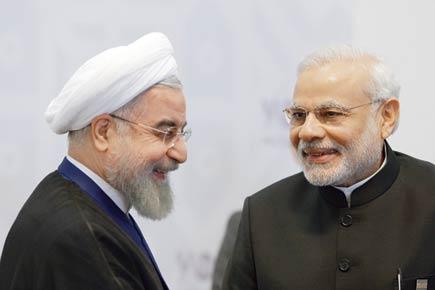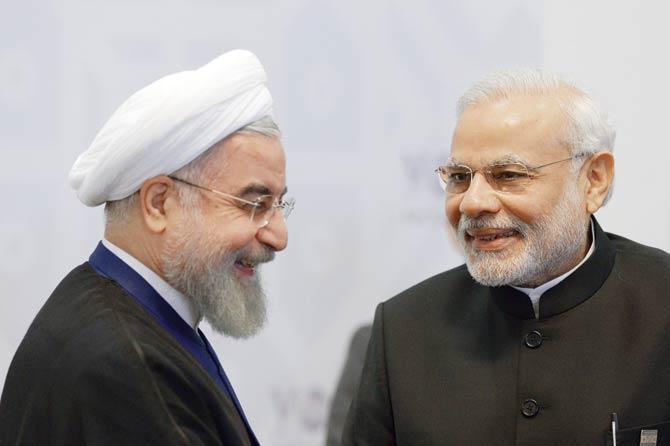Almost everyone is agreed that the recent Iran-US nuclear deal has opened up a raft of opportunities for India — economic and geopolitical — as well as other countries. But major obstacles still remain, primarily the political divisions in the United States.

 Almost everyone is agreed that the recent Iran-US nuclear deal has opened up a raft of opportunities for India — economic and geopolitical — as well as other countries. But major obstacles still remain, primarily the political divisions in the United States.
Almost everyone is agreed that the recent Iran-US nuclear deal has opened up a raft of opportunities for India — economic and geopolitical — as well as other countries. But major obstacles still remain, primarily the political divisions in the United States.
ADVERTISEMENT

During his meeting with Prime Minister Modi at the sidelines of the Ufa summit, President Hassan Rouhani of Iran called on India to invest in infrastructure projects worth $8 billion. Pic/AFP
At the textbook level, the US Senate has to approve international treaties by a two-thirds majority vote. But as per current practice, the deal is deemed as an "agreement" and not "treaty" and hence Congress can be ignored. But in a democracy things don't quite go by the textbook. As things stand, Obama and the Congress have agreed to have the latter the right to vote to void the deal. But the President will veto such a vote, and its mainly Republican opponents will not be able to get a significant number of Democrats to overcome the veto. Lifting Iran sanctions will also be a problem, though the President has the right to suspend Congress-approved sanctions for two years before requiring its approval to lift them.
The US opponents must mull the consequences of blocking the deal at this stage. Till now the P-5+1 group of big powers has presented a united front and forced Iran to come to the table. But should the US renege, Russia and China, who have not been particularly happy about the Iran sanctions, will pull out, as will countries like India and Japan, which have borne the adverse consequences of the embargo.
New Delhi followed the US' lead in squeezing its oil trade with Iran. Prior to the sanctions, in 2011, Iran was India's second largest supplier of crude oil after Saudi Arabia. Currently it is seventh. Though India was one of six nations allowed to purchase a limited quantity of crude under the sanctions regime.
Indian companies like Essar, Tata and oil and gas majors have been mooting investments in Iran since the early-2000s, but they have not put down any serious investments in the country because of the sanctions which actually began in the mid-2000s. As a result, in April this year, the frustrated Iranians withdrew an offer to Indian firms to develop the Farzad B Gas field.
Over the past five years, New Delhi developed a variety of tactics to deal with the Iranian situation. Besides getting exemptions from oil trade sanctions, India also managed to work out a Rupee-Rial arrangement to maintain their trade relations. Indian companies were advised to work through Turkish, Chinese and Russian entities, or set up corporations without vulnerable US assets.
India has made it clear from the outset that it is against Iran getting nuclear weapons. This may sound strange coming from New Delhi, but unlike India, Iran signed the NPT and has given a solemn commitment that it will not make nuclear weapons. In 2005, as part of the western drive against Teheran's dubious actions on the nuclear front, India voted twice in the IAEA to censure Iran. But, most people acknowledged that New Delhi had little choice, considering that it was at a critical phase in its own nuclear deal with Washington.
First, and most importantly, what binds India and Iran are geopolitical interests. We have been together since 1990 in helping Afghan parties to fight the Taliban. In the 2000s in Afghanistan, India built a highway from Zaranj, which is close to the Iran border, to Delaram, to facilitate the linkage of the country from the non-Pakistani territory in the west. Both of us also have a somewhat jaundiced view of Pakistan who we border, albeit for different reasons.
Now Iran has also emerged as an important ally in fighting the Islamic State. While India may not be immediately threatened by the Daesh, it cannot be complacent. However, it can be sure that the Iranians who are the targets of Sunni fanatics will be on the same side as us.
Second, Iran offers a vast market for Indian products. In the last few years, India has been exporting rice and sugar to Iran against Rupees accumulated in Indian banks due to the US sanctions. But as trade normalises, India has opportunities to develop a market for automobile parts, pharmaceuticals and IT products, provided we understand that now we will be facing competition from a variety of sources.
Third, Iran's vast oil and gas resources, which are proximate to India, are vital for our energy security. So far we have dithered on gas projects, as well as in developing the Chah Bahar port. But of late, things have been moving. During his meeting with Prime Minister Modi at the sidelines of the Ufa summit, days before the final agreement between Iran and the P5+1 powers was announced, President Hassan Rouhani of Iran called on India to invest in infrastructure projects worth $8 billion.
Fourth, Iran offers us wider geopolitical opportunities by developing multi-modal routes to Central Asia and Russia. The elements of two parallel North-South Corridors — one going north from Bandar Abbas to the Caspian, and thence to Russia and Europe, and the second going from Chah Bahar to Afghanistan and Central Asia are all there. What is needed is to complete several critical rail and road links that Rouhani is inviting us to build. This would be a worthy riposte to the Chinese Belt Road Initiative.
The opening of Iran will alter the geopolitics of south-western Asia. Even so, India needs to tread with care. There are other factors we need to take into account — our ties with Israel and key partners like Saudi Arabia and the UAE, and, for that matter, the United States. But this should not in any way constrain our initiatives with Iran. We need to move beyond the phase of dithering that has characterised our ties with Tehran for the last decade.
The writer is a Distinguished Fellow, Observer Research Foundation, New Delhi
 Subscribe today by clicking the link and stay updated with the latest news!" Click here!
Subscribe today by clicking the link and stay updated with the latest news!" Click here!






